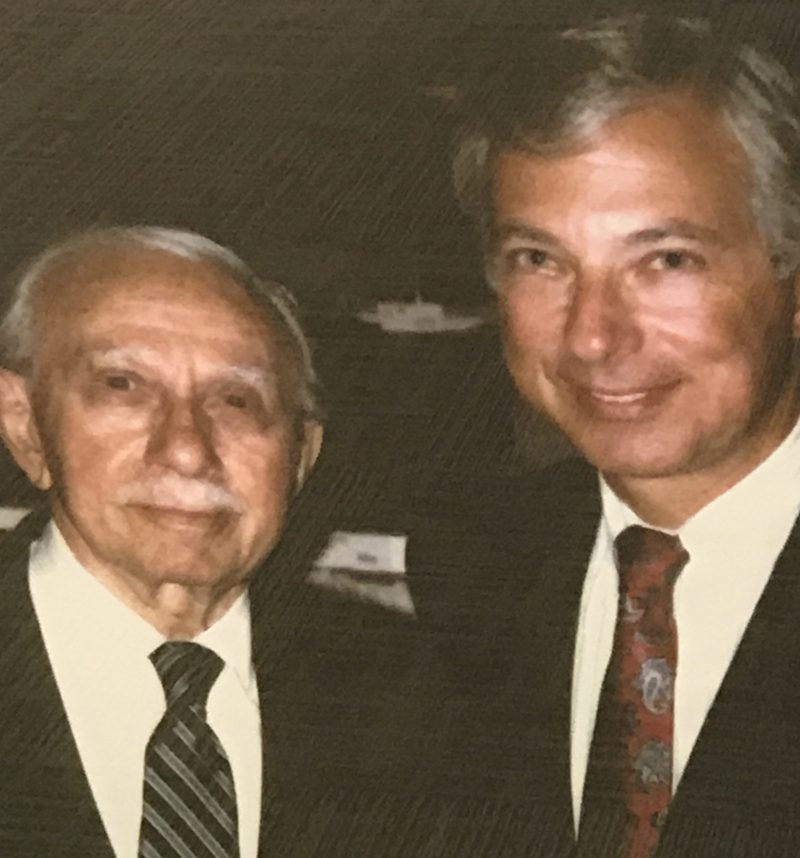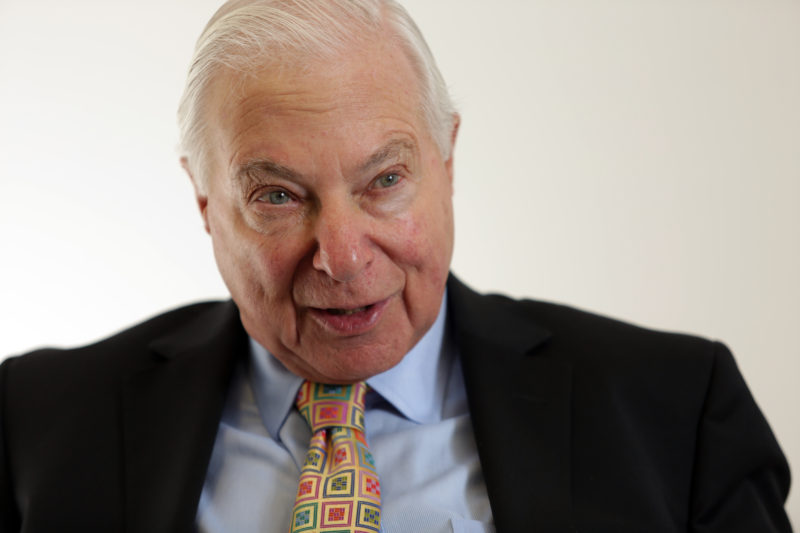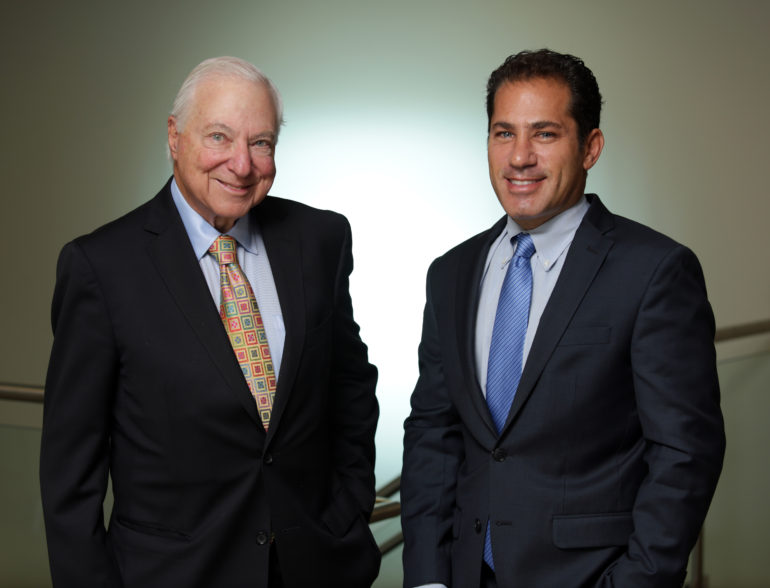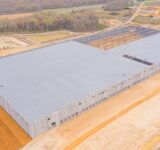Barry Mandelbaum (left), chairman of Mandelbaum Salsburg P.C., and stepson Craig Alexander, an attorney in the real estate practice, are pictured at the firm’s Roseland headquarters. — Photo by Aaron Houston for Real Estate NJ
By Joshua Burd
As Barry Mandelbaum recalls, his introduction to real estate was more or less accidental.
By the early 1970s, he was a decade into his law career, having established himself as a criminal defense and personal injury attorney, when a painter named Bob Sibello walked into Mandelbaum’s office seeking his help to collect money he was owed by a builder.
“As luck would have it, I got him his money,” Mandelbaum said matter-of-factly. “And then he told me he wanted to go into the development side of real estate with a builder who lived next door to him in Cedar Grove, so I met him and I started representing him.”
One introduction led to another. Eventually, Mandelbaum became the attorney for Jack Burstyn, who was in the business of finding land and partnering with the likes of Joseph Kushner, the Halperns, the Wilfs and other now-prominent real estate families in New Jersey.
“That’s the way you sometimes get involved in things,” Mandelbaum said, later adding: “In those days, lawyers did everything and you learned as you went along.”
Real estate has been Mandelbaum’s primary focus ever since and a driving force behind Mandelbaum Salsburg P.C., an 88-year-old law firm with deep ties to many of the state’s prominent multigenerational developers. For decades, the firm has been a steady hand for a list of clients that also includes the Zuckerman, Katz, Atkins and Witmondt families, allowing it to expand and adapt amid the highs and lows of real estate.
“We keep going through phases,” said Mandelbaum, the firm’s longtime chairman. “And whatever the phase is, you have to be there to take care of it, to service your clients because your clients are also flexible.”

Based in Roseland, the law firm is a multigenerational business in its own right. Barry’s father, Irving Mandelbaum, was focused primarily on matrimonial law when he began as a sole practitioner in 1930. The younger Mandelbaum joined his father in 1961, spending his early years as a criminal defense attorney before expanding into personal injury law.
He then took the reins in 1968 after his father suffered a stroke, Mandelbaum said. In the decade that followed, he would join with attorneys Richard Salsburg and Yale Lazris, allowing him to pivot away from litigation and focus on real estate.
The real estate group has since grown into a full-service practice. With a steady stream of land use and other related work — with developer clients who were seeking loans — Mandelbaum in the 1980s expanded into banking and financial services. Subsequently, he began to represent commercial real estate lenders such as Midlantic Corp., which had become a major client before it was acquired by PNC Bank Corp. in 1995.
The real estate practice also paved the way for its expansion into environmental law, starting in the mid-1980s as regulations such as the Industrial Site Recovery Act took hold in the state.
“All of a sudden, environmental became very, very big,” Mandelbaum said. “So it’s always a changing scene.”
That view is also reflected in the fact that Mandelbaum Salsburg has expanded its focus on redevelopment and payment in lieu of taxes agreements, following the most recent real estate downturn. And it has gradually added real estate investors to its client base, both in New Jersey and across the country, after being mostly focused on developer clients in its earlier years.
Mandelbaum notes that the firm has seen the rise and fall of the state’s suburban office market — from the boom times of the 1980s and 1990s to the past decade, when large, defunct campuses have become targets for redevelopment — as well as the growing shift from single-family to multifamily development. He also recalls “when industrial was at the bottom of the barrel,” but today has been recast as logistics and is now the darling of real estate.
Mandelbaum Salsburg has followed those trends alongside the real estate families that are among its clients. And the practice includes its own multigenerational team: Mandelbaum’s stepson, Craig Alexander, is among the firm’s roughly dozen real estate attorneys who work hand in hand with many of those developer clients.
For instance, both Mandelbaum and Alexander were involved in a transaction that brought together Woodmont Properties and the Atkins Cos. for a joint venture in Gloucester County. The law firm effectively played matchmaker for the mixed-use project in Washington Township, where the developers are building more than 300 apartments, 100 townhomes, 70,000 square feet of medical and retail space and a 110-unit assisted living facility.
“There’s a certain level of comfort and credibility inherently when they know the firm, they know the attorneys and their father and grandfather used them,” said Alexander, who joined the firm in 1995. “It’s a level of credibility that you don’t have normally.”
Mandelbaum also believes that longtime, multigenerational clients feel they will be getting a good value when it comes to legal services.

“I grew up in an era where we didn’t even bill based on time or have timesheets, and I think one of the things that has happened in law is that the timesheet and the measurement of how much time you spent has become the holy grail of how much you charge,” he said. “And it’s my opinion that you keep track of time solely to see where you’re at — and maybe that’s the first thing you look at — but you have to look at: What is the value you gave? What was the transaction about?
“So I think that we’ve always been very, very mindful of charging based on value and the services we provided, rather than just saying. ‘We spent 10 hours — you owe us X.’ ”
It also goes beyond simply checking boxes during a deal, he said.
“I think it’s a question of also not just going through the steps of doing a real estate transaction. You have to think about the transaction and guide the people,” Mandelbaum said. “I think that lawyers today need to do that or should do it more. And I think we’ve always been very good at finding solutions … because there are always some impediments, there was always some obstacle, and in many transactions, it’s overcoming those obstacles that I think makes us different.”
He added that he has personally partnered with clients to build what he estimates to be around 600 houses, which adds to the comfort level but also reinforces his understanding of the development process.
Mandelbaum Salsburg has taken steps to position its real estate practice for the future. While several attorneys in the group have multiple decades with the firm, it has made three new hires in the last two years.
That expansion has taken place alongside changes at the highest levels of the business. The firm in 2016 named Bill Barrett as its co-CEO with Mandelbaum. Earlier this year, Barrett took over the role exclusively, while Mandelbaum continues to be the firm’s chairman.
“It’s the same thing we always advise our corporate clients: If you want your company or your business to survive, you need to have a succession plan,” Mandelbaum said. “So I just felt it was time that the operational reins get turned over to somebody else. Not that I’m not capable of doing it anymore, but I just think it’s an important thing from a succession planning (standpoint).”
Beyond that, Mandelbaum said many of the firm’s roughly 80 attorneys are in their 40s and 50s, so “it’s good to have a younger CEO that they can really feel a good rapport with.”
Asked if it was difficult to relinquish the chief executive role after so many decades, Mandelbaum said there is nothing difficult about doing what’s best for the business.
“The only way that things can continue is to plan for the future, so it hasn’t been difficult,” Mandelbaum said. “Bill and I get along very, very well and we have mutual respect. So I think it’s been excellent for the law firm and our growth.”
Looking back
Asked about some of his most memorable projects as an attorney, Barry Mandelbaum has plenty to choose from.
One such project came in the 1970s, when he was transitioning his focus to real estate and development. It was during that decade when the developer Prel Corp. had embarked on a massive residential development in Lopatcong known as Brakeley Park. As outside counsel to the company, Mandelbaum spent several years attending planning board meetings every Tuesday night, he said. Not to mention zoning board meetings on Thursdays.
That provided him with a perch to see the early transformation of a site that spanned hundreds of acres, he said, even though Prel would ultimately face Chapter 11 bankruptcy proceedings and sell off parts of the site to other developers.
“It was a giant project and I remember when we got started … and then basically watching a city grow,” Mandelbaum said. “That was an exciting thing, to work with everybody in taking this vast farmland and planning a large residential community.”










